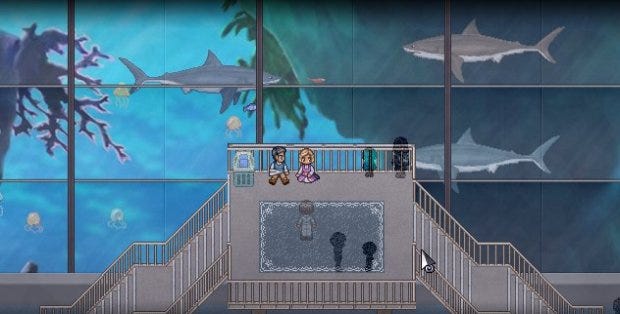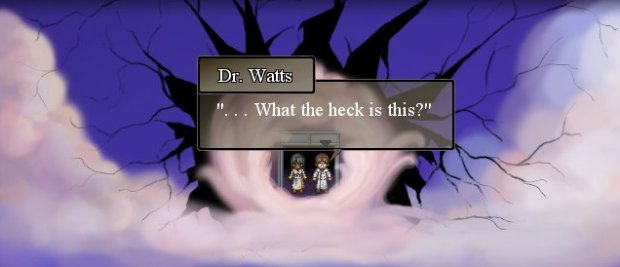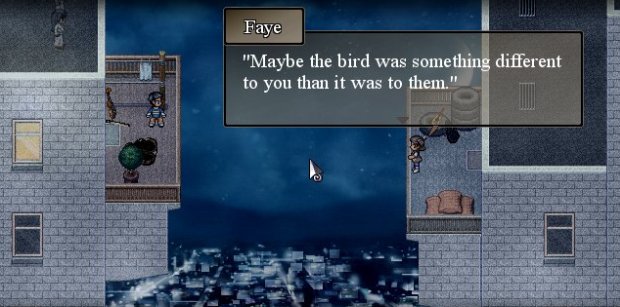Wot I Think: Finding Paradise (To The Moon 2)
Cloud 8.4
To The Moon is one of my favourite gaming experiences. No game has made me blub as hard, or as often, and it earned those tears through a funny, passionate, emotionally complex story. Finding Paradise, a direct sequel after a number of smaller asides, didn't make me cry. It made me laugh, think, wonder, and finish with a sad smile on my face, but no tears. But games aren't measured by how much they make you cry, people, come on.
Once again we're following doctors Eva Rosalene and Neil Watts as they navigate the murky morality of adjusting a dying man's final memories. Working for Sigmund Corp., their business is granting people their dying wish, by meddling in their minds to give them memories of moments that never happened, but they wish had. By working backward through key poignant memories, linked by pivotal mementos, they trace their way back through a person's life, until they can thread together their memories such that new ideas or ideals are implanted.
It's an excellent concept, its immediately benevolent-sounding notion belying a complex and morally dubious conceit. Does it matter that someone might find happiness in something that is wholly false? Are real memories more important? Do "real" memories even exist? The first game, To The Moon, explored this with exceptional deftness, as the seemingly simple wish to have memories of having travelled to the moon become embroiled in the complexities of a long, complex marriage, and unrecognised regrets.
Finding Paradise, which rather bravely/foolishly omits the "To The Moon 2" from its title, picks up some unspecified time after, with Rosalene and Watts heading off to a new client, another elderly man about to die, who signed up to the program. His wife is not pleased, his son bemused, but the contracts are signed and the patient's wishes must be met. So after some confusions about paperwork, and the bickering back and forth between the leads fans of the series will be pleased to know remains central, they enter his mind and begin to explore.
Rosalene and Watts have very different perspectives on the nature of their job (such that to explain them in too much detail is too big of a spoiler for the first game), and this game explores their motivations alongside the core story of one Colin Reeds, a man whose motivations for hiring Sigmund are extremely unclear, seemingly hinged on a melancholy even he doesn't quite understand. He loves his wife, his son, his life. He does not want to forget his family, or his life with them. But he feels a dissatisfaction, a notion that as much as he's appreciated his life, it wasn't to the fullness he had expected. You know, I immediately didn't like Colin for this. Of course, it was always going to be more complicated.
Finding Paradise does what you might hope a sequel would do. It takes the original idea, and then throws in some surprises. I'm in that usual unenviable position of reviewing a game that is almost entirely story and little else, without being able to tell you what that story is. I think it's fair to say the initial oddity is Colin's memories don't appear to be playing out in the correct order. Beyond that, I'll keep shtum. What's going wrong, and whether it's to do with the patient, or the suspicious activity we've seen from Dr Watts in the previous minisodes and the start of this one, is wholly unclear. But anyone who's finished To The Moon will know Watts is always far more complicated than his armour-like veneer of sarcasm and dismissiveness wants to suggest.
What follows is an eclectic mix of visual novel and point and click adventure, jam-packed with video game references via Watts' obsession (and programming), philosophical musing, and emotional recollections. I feel certain saying that it absolutely doesn't have the emotive heft of To The Moon, but I'm also not sure it aimed for it. Colin Reeds' tale is more nuanced, less romantic, and not being quite sure where you are with him for a portion of the game seemingly deliberately keeps you at an emotional arm's length. It makes for a less impactful finale, no doubt, but it was also significantly less bruising to play.
As it happens, I correctly (and not deliberately) guessed the twists and turns in Finding Paradise before they were telegraphed. I hate guessing, never try to, because it's much more fun to be surprised than it is to smugly inform others you knew something was coming. I do wonder how different my overall experience of the game might have been if I'd been taken aback at any point. Being only one person, I'm not at all able to judge if this was my own bad luck, or the game's.
What is unquestionably the game's bad luck is the engine. RPG Maker is a creaky old beast at the best of times, and pretty much every negative I have to say about the game falls at its feet. It doesn't scale up well, and with only the option to play in a tiny postage stamp window, or full screen, it really began to strain when stretched to 3440x1440 (albeit with large tramlines either side). I'd love to have played it in a 3 or 4x window, which also would have removed the issues I had with hotspots not being correctly placed. (When I ran the game in a tiny window, these worked fine, but the game was too small to play.) And while we've seen RPGM used to extraordinary effect in games like OneShot, and even to some extent this year's Rakuen, I'm not sure it really benefited Finding Paradise. Dear god, just to have been able to walk in a diagonal line...
However, it's used to its capacity. There are some lovely moments of mixed graphical styles, even a scene in which the scenery breaks away into a shattered hole, which I was very surprised the engine could be bent to do. And the pixel art and animations are absolutely beautiful throughout, including the best rendition of gloat-dancing gaming has ever seen. And the music - just wonderful. When two major characters play piano and cello, you know it's going places. And of course ends with a lovely song by Laura Shigihara.
The whole game is packed with lovely moments, and while for some mad-brained reason developer Kan Gao is determined to include arcade sequences, they're done with some wit this time, perhaps even self-referentially, and they're skippable for the fainthearted. Talking of self-critiques, there's a great reference to the weaker reception the 'minisode' entry A Bird Story received (a game I disliked). This isn't done archly, and absolutely not sneeringly, but a deprecatingly sincere way. A character sadly refers to how that story about an injured bird from his childhood never goes down well when he tells it. His friend replies, "Maybe the bird was something different to you than it was to them?" Fair enough, you know? Maybe that really was it.
"Or," adds the friend, "maybe you just sucked at telling that story."
My only criticism of how the story was told is the slightly bloated middle. There comes a point in the game where the process of changing memory, then listening to the various conversations taking place to gather the memory orbs necessary to start the next, then changing memory, becomes a touch routine. All the story you're gathering is interesting, vital to the arc, but it's here the folly of the game's interaction becomes a little too obvious - this is, really, a performance of a story where you move your characters around the screen to trigger the next act. When it's varied enough, you don't notice or don't mind.
Finding Paradise is a considered story, and by the end there's a great deal of looking back and musing to do. If it had been the first game, if I'd not played the triumphant To The Moon before it, to inescapably compare it to, I think I'd be raving. It's not quite as good, but it's vital not to let that be the only measure. It, itself, is a lovely story well told, with great humour, moments of genuine pathos, and plenty of intrigue. It hasn't made an impact on me like its predecessor did, it doesn't have the same weight, but it remains a superb time. You absolutely should play it if you've played To The Moon. If you haven't, you should blooming well go and play that, and then this.
Finding Paradise is out now for £7/$9/9€ on Windows, Mac and Linux, via GOG, Steam and soon Humble.













